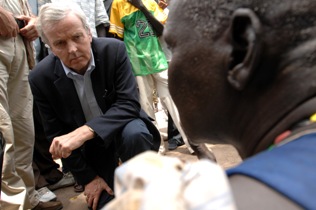UN “worried” about IDPs accessibility in S. Sudan’s Jonglei state
By Thon Philip Aleu
May 8, 2009 (BOR) – UN humanitarian officials, who visited people displaced to Akobo in Jonglei State today, expressed worries that humanitarian assistant will be cut off this rainy season.
 John Holmes, the Undersecretary General for the Humanitarian Affairs for the United Nations, on Friday visited Akobo where he met with some of the thousands of men, women and children who have been displaced by recent tribal fighting.
John Holmes, the Undersecretary General for the Humanitarian Affairs for the United Nations, on Friday visited Akobo where he met with some of the thousands of men, women and children who have been displaced by recent tribal fighting.
“The scale of conflict, scale of death, scale of destruction is really worrying,” Holmes told reporters in Akobo in Jonglei state that is the scene of the fighting. Many of those he met told him of their plight, some of them recounting how they had lost relatives in the violence.
“These men, women and children are obviously in desperate need. Based on what I heard from the families I have spoken to, we urgently need not only increased humanitarian assistance but also action to reconcile differences and stop this cycle of violence,” he stated.
There are currently 24 aid groups responding to the increasing needs of the internally displaced persons (IDPs) in 7 of the 10 states of Southern Sudan, OCHA said.
Tribal disputes over cattle and children have escalated in recent months in Jonglei between two rival Lou Nuer and Murle. Some 453 people were killed in March. Hundreds more were killed in reprisal attacks in April.
Holmes said it was possible thousands had been killed overall, adding that “nobody really knows” the true toll.
Liz Grande, the deputy resident coordinator for the UN in South Sudan, told reporters following a meeting with State officials that rainy season which began few weeks ago is a bottleneck.
“We are very worried about the rainy season because that means the access is going to be cut off,” said the UN regional official. “That is one of the things we are working [on] with the State government to improve.”
About 15,000 people are displaced to Akobo town following the tribal fighting between Murle and Nuer tribes in Akobo County in April, 2009. 7,000 others are fled their homes to Pibor town as the result of the retaliatory attack by Lou-Nuer on Murle tribesmen in March, 2009.
Both Pibor and Akobo counties are inaccessible by roads during rainy seasons; prompting Gov. Kuol Manyang Juuk to call for alternative means – that is dropping food items by planes. Mr. Manyang also told reporters at Bor airstrip that “we will do our level best to bring peace to our people.”
“We also appeal to our people to stop fighting themselves and give chance for peace. It is peace that can bring them welfare. This can only happen when there is peace,” Gov. Kuol said.
As part of the efforts to end tribal conflicts, Duk and Urrol, Nyirol, Ayod Counties have peace meeting underway. The peace conference, earlier scheduled to kick off today May 8, has being proposed for the weekend.
In Juba, Holmes met with Vice-President Dr. Riek Machar, and reviewed the humanitarian needs in Southern Sudan, including concerns about food security as well as the victims of violence. They agreed to continue to work closely together to resolve issues.
He welcomed the excellent cooperation enjoyed by Agencies and NGOs from the Government of Southern Sudan.
(ST)
